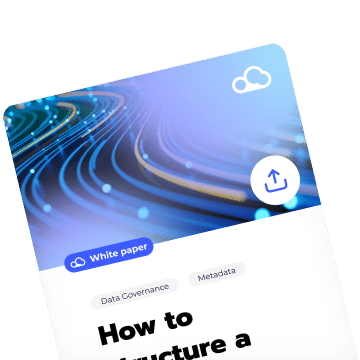
Top 3 data roles benefitting from using a data catalog
Nothing is more important for a data-driven company than an organized data catalog. It’s an essential tool for those who work with data daily that allows users to collect, organize, and standardize a company’s data. So, who should be using a data catalog in 2024 and why?
Before launching into technical data optimizations, it’s necessary to ensure that all the company’s data collaborators, including business users, share the same language. If they can’t understand each other, it won’t be easy to standardize the use of data for the entire company.
What is a data catalog?
The data catalog is a tool that describes the data and provides a global view of all the data used by the company’s different business lines. It also serves as an interface to organize the data and make it accessible and intelligible to all data teams.
- Data technicians (IT, Data Analyst, etc.)
- Data architects and governors
- Business users
A data catalog enables employees from all teams to collaborate using centralized, homogeneous data sets by providing clarity about data definitions, lineage, and essential business attributes so all users can understand and leverage their data as an asset. Data catalogs help users take control of their data: Derive valuable insights to drive informed decision-making, identify opportunities for innovation, and optimize business strategies for growth and competitive advantage all under one user-friendly roof.
A data-centric organization cannot be invented, it must be built! A company that wants to adopt a data culture must surround itself with experts and the right tools, starting with a data catalog.
Top three roles that use a data catalog
#1: Chief Data Officer
One of the main users of the data catalog in 2023/2024 is the Chief Data Officer (CDO), who is responsible for the company’s overall data strategy. They are the conductor of the data culture: They lead the optimization of the collected data and take care of its organization. Internal or external, all data is under their responsibility. The CDO, whose job is 100% business and strategy-oriented, works in collaboration with the Director of Information Systems to pilot the deployment of the company’s data catalog.
The CDO needs a data catalog to:
- Implement the data governance strategy
- Create a common language around the company’s data
- Define the rules and glossary in agreement with the business referents
- Coordinate the needs of all stakeholders
#2 Business Intelligence Manager
Although business-oriented, the Business Intelligence Manager has a more technical and operational role than the CDO. They are responsible for data analysis and management of the company’s IT projects and for data collection and retrieval. The Business Intelligence Manager needs a data catalog to:
- Have reliable data to analyze to make sound business decisions
- Verify the source of the data
- Oversee the modifications and analyses made by the business referents.
#3 Data Scientist
Responsible for data management and analysis, the Data Scientist’s role is to find solutions for the end users of the data. They design and test algorithms that allow them to study the data from all angles. Their role involves testing different technical solutions before presenting them to other data users.
The Data Scientist needs the Data Catalog to:
- Track the source of data before analyzing it
- Check the reliability of the data used
- Trace the origins and history of the data
- Communicate with the data users and create valuable indicators for the business
Other data catalog users
There are many other data functions and jobs that need and can create immense value from data catalogs.
- The Data Steward is responsible for the operational application of the company’s data: Definition of the data, the quality level, and the applicable treatments.
- The Data Architect is the interface between the business and IT. Their role is to model the data and the processing architecture and manage how the data is made available.
- The Data Protection Officer is the guardian of the data. They check that the use of data (public and personal) and the processing applied to comply with the law.
Making the most of your company’s data
The data catalog is an ideal tool to master your company’s data and extract strong business value from it. That’s why this tool will allow for more effective decision-making processes and more efficient management of data structures by teams. As companies become more data-driven, it is crucial that everyone, from the highest levels of management to the contributors who create the data, communicate effectively with each other. A data catalog is an ideal tool for ensuring that happens—though the most effective use cases will vary from company to company.
—
Still have questions about data and metadata management? Turn to DataGalaxy to create your company’s data lineage mapping, develop a standardized business glossary, and much more! Check our calendar and select a date that works for you to jumpstart your free 15-day platform trial access & start making the most of your data today!




